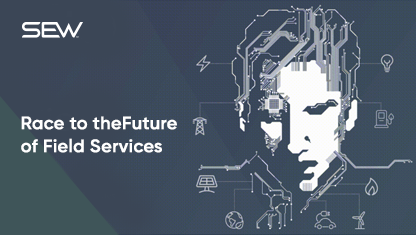Did you know that utility companies can lose up to 30% of their revenue due to inefficient field service management?
Or that preventable issues, such as faulty equipment or poor maintenance, cause 30% of power outages?
Field Service Management (FSM) is crucial for energy and water providers as it enables them to maintain the infrastructure that keeps the lights on and the water flowing for their customers. Effective field service management includes everything, from inspecting and repairing power lines and water mains to responding to outages and service requests.
Progressive utilities have identified that field service management is a critical component of the digital transformation journey. It can help utilities evolve into digitally-enabled, user-centric organizations by maintaining, enhancing, and streamlining operations. By effectively managing their field service operations, energy and water providers can improve their efficiency, reduce costs, and increase customer satisfaction. Additionally, modern Field Service Management platforms can enable utilities to track inventory better, schedule maintenance, and optimize routes, further improving their overall operations.
Digital platforms and technological interventions are redefining utility field services. Here’s how field service management innovation can help energy and water providers become future-ready utilities:
- Process Automation: Digital Field Service Management platforms help utilities eliminate paper-based processes and manual, time-intensive efforts. It provides information to field workers on the go via their mobile, tablets or other portable devices. Field Service Management platforms help utilities optimize their field service operations with features such as automated job assignment, real-time location tracking, and mobile capabilities for field workers. Additionally, next-gen Field Service Management platforms offer connected experiences to the users by seamlessly integrating across multiple utility systems and back-end processes to provide a more comprehensive view of customers and operational data. This helps utilities increase workforce productivity, improve customer service and reduce operating costs. Utilities can also improve their carbon footprint by eliminating paper-backed models and printing activities.
- Predictive Maintenance: Energy and water providers can utilize AI/ML capabilities to conduct predictive maintenance of their infrastructure. Using predictive models, anomaly detection and root cause analysis, utilities can identify and prioritize the assets most at risk of failure and focus their maintenance efforts accordingly. Leveraging ML algorithms, utilities can also optimize maintenance schedules and resource allocation, considering factors such as asset criticality, cost, and safety. Shifting their operational model from a reactive to a more proactive approach using AI/ML technologies can help utilities reduce downtime, improve asset reliability, and lower maintenance costs. This also allows utilities to improve safety and compliance.
- Remote Service Assistance: With emerging technologies such as AR, VR and, drones, utilities are setting new precedents in field service operations. These technologies enable field workers to access real-time information and remote guidance from experts. By providing remote service assistance, utilities can minimize the downtime caused by asset failures, which reduces the impact on customers and the overall operations of the utility. It also provides a safer working environment for field workers by reducing their need to travel to remote or hazardous locations. Remote monitoring and diagnostics enable service providers to receive real-time data from the field and perform asset analysis remotely to identify and prevent issues before they occur.
- Workforce Training: A critical feature of today’s Field Service Management platform is the ability to provide immersive, hands-on training to field workers. This can take the form of VR-powered simulations to allow workers to practice tasks and procedures in a safe or controlled environment. It can also provide the option of online, on-the-go learning to field workers, where they have access to a repository of training resources on their mobile devices. Field Service Management platforms can encourage collaborative learning by enabling field workers to connect, share and learn from their peers and company experts. By adopting digital tools to provide workforce training, utilities can ensure that their workforce has the skills and knowledge they need to perform their jobs safely and effectively.
- Intelligent Decision-making: Field Service Management platforms provide a comprehensive view of the utilities to enable intelligent decision-making. The platform gathers, processes, and analyzes real-time data on the status of field workers, equipment, assets and customer interactions, allowing utility companies to make informed decisions about resource allocation and customer service. Advanced Field Service Management platforms can use geospatial information to track assets, equipment, and field workers and optimize routes for work orders. The reporting and analytics features provided by modern Field Service Management platforms can deliver utilities with detailed reports and intuitive dashboards that can monitor performance, identify trends, and make data-driven decisions.
- Communication and Collaboration: Field Service Management platforms transform utility organizations from disjointed departments and siloed operations to integrated entities with enterprise-wide collaboration. Available to field workers as mobile apps, digital platforms allow them to access work orders, customer information, and other relevant data. The digital tools can enable field workers to share and access documents and other resources in real-time. Advanced features such as chatbots and messaging are essential for information sharing and allow field workers to communicate and collaborate with their peers and supervisors in real time. By investing in effective Field Service Management platforms, utilities can build a connected ecosystem for frictionless service delivery.
Effective field service management is an important frontier for utilities to drive field worker satisfaction, improve operational efficiency and enhance customer service experiences. Equipped with digital and mobile technologies, utilities can create superior workforce experience, connected journeys across customer touchpoints and streamlined people experiences.
SEW’s Smart Mobile Workforce (SMW®) is the #1 Digital Workforce Experience (WX) platform for energy, water and gas providers, worldwide. SMW® helps in intelligently managing the field operations to make the service experiences effortless for the end customers. From work order management to AI/ML-based schedule and dispatch, SMW® delivers real-time visibility into workforce with simple, intuitive platform experiences, improves operational efficiency and assures seamless service delivery. To learn more, reach out to us at [email protected]













